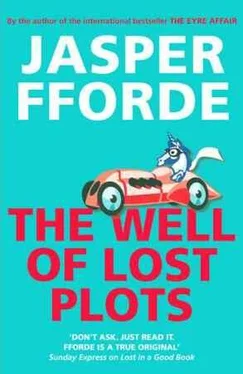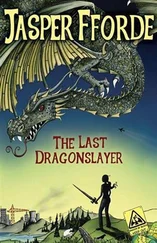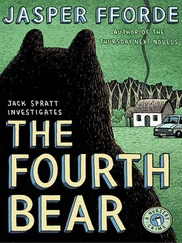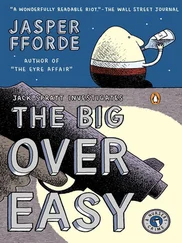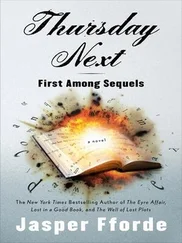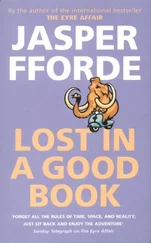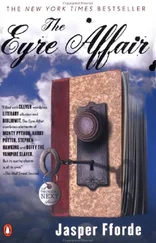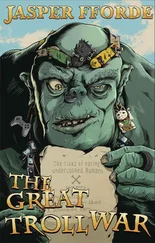' Flatland ,' said Bradshaw after pausing for a moment's reflection. 'It was the last original idea, wasn't it?'
'Pretty much. The few leftover pieces were mopped up by the SF movement until the 1950s, but as far as pure ideas are concerned, 1884 was the end. We were expecting the worst — a meltdown of the whole BookWorld and a wholesale departure of readers. But that didn't happen. Against all expectations, recycled ideas were working .'
'But isn't it the way they are told?' asked Havisham in her not-to-be-argued-with voice. 'Surely the permutations of storytelling are endless!'
'Large perhaps, but not infinite , Miss Havisham. What I'm trying to say is that once all the permutations are used up there will be nowhere for us to go. The twentieth century has seen books being written and published at an unprecedented rate — even the introduction of the Procrastination1.3 and Writer'sBlock2.4 Outlander viruses couldn't slow the authors down. Plagiarism lawsuits are rising in the Outland; authors are beginning to write the same books. The way I see it we've got a year — possibly eighteen months — before the well of fiction runs dry.'
He paused to let this sink in.
'That's why we had to go back to the drawing board and rethink the whole situation.'
He flipped the chart again and there were audible gasps. On the chart was written '32-plot story systems'.
'As you know,' he went on, 'every Book Operating System has at its heart the basic eight-plot architecture we inherited from OralTrad. As we used to say: "No one will ever need more than eight plots.'"
'Nine if you count Coming of Age ,' piped up Beatrice.
'Isn't that Journey of Discovery ? said Tweed.
'What's Macbeth , then?' asked Benedict.
' Bitter Rivalry/Revenge , my dear,' answered Havisham.
'I thought it was Temptation ,' mused Beatrice, who liked to contradict Benedict whenever possible.
'Please!' said the Bellman. 'We could argue these points all day. And if you let Libris finish, you can.'
The agents fell silent. I guessed this was a perennial argument.
'So the only way forward,' continued Libris, 'is to completely rebuild the operating system. If we go for a thirty-two-plot basis for our stories, there will be more ideas than you or I will know what to do with. The BookWorld won't have seen such an advance since the invention of movable type.'
'I'm always supportive of new technology, Mr Libris,' said Lady Cavendish kindly, 'but isn't the popularity of books a fair indication of how the good the current system actually is?'
'It depends what you mean by "popular". Only thirty per cent of the Outland read fiction on a regular basis — with UltraWord™ we aim to change all that. But I'm running ahead of myself — an abundance of new ideas is only half the story. Let me carry on and tell you what other benefits the new system will give us.'
He flipped the chart again. This time it read: 'Enhanced Features'.
'Firstly, UltraWord™ is wholly reverse compatible with all existing novels, plays and poetry. Furthermore, new books written with this system will offer bonus features that will enhance and delight.'
'I say,' asked Bradshaw slowly, 'how do you hope to improve a book?'
'Let me give you an example,' replied Libris enthusiastically. 'In books that we know at present, dialogue has to be dedicated to the people who are talking as the reader has no idea who is speaking from the words alone. This can be tricky if we want a large scene with many people talking to one another — it's very easy to get bogged down in the "… said George", "… replied Michael", "… added Paul" and suchlike; with the UltraWord™ Enhanced Character Identification™, a reader will have no trouble placing who is speaking to whom without all those tedious dialogue markers. In addition, UltraWord™ will be bundled with PlotPotPlus™, which gives the reader a potted précis if they are lost or have put the book down unfinished for a few months or more. Other options will be ReadZip™, PageGlow™ and three music tracks.'
'How will the reader get these new features to work?' asked Lady Cavendish.
'There will be a preferences page inserted just after the frontispiece.'
'Touch sensitive?' I asked.
'No,' replied Libris excitedly, ' read sensitive. Words that know when they are being read. On the preferences page you can also select WordClot™, which adjusts the vocabulary to the reader — no more difficult words, or, if you like difficult words, you can increase the vocabulary complexity.'
There was silence as everyone took this in.
'But to get back to your point, Lady Cavendish, a lot of people reject fiction because they find reading tedious and slow. At present levels the fastest throughput we can manage is about six words per second. With UltraWord™ we will have the technology to quadruple the uptake — something that will be very attractive to new readers.'
'Cards on the table and all that, Libris,' said Bradshaw in a loud voice. 'Technology is all very well but unless we get it absolutely right, it could turn out to be a debacle of the highest order.'
'You didn't like the ISBN positioning system either, Commander,' replied Libris, 'yet book navigation has never been easier.'
They stared at one another until a loud belch rent the air. It was Falstaff.
'I have lived,' he said, getting to his feet with a great deal of effort, 'through much in my time; some good, some bad — I was witness to the great vowel shift, and remember fondly those better days when puns, fat people and foreigners were funny beyond all. I saw the novel rise and the epic poem fall, I remember when you could get blind drunk, eat yourself ill and still have change for a whore out of sixpence. I remember when water would kill you and spirits would save you; I remember—'
'Is there a point to all this?' asked Libris testily.
'Ah!' replied Falstaff, trying to figure out where he was going with his speech. 'Oh, yes. I was there for the much-heralded Version 4 upgrade in 1841. "Change the way we read for ever," quoth the Council of Genres. And what happened? The Deep Text Crash. Almost everything by Euripides, Aeschylus and Sophocles gone for ever — and we created grammasites.'
'It was never proven that Version 4 created the grammasites, Sir John—'
'Come, come, Libris, have you dried your brain? I was there. I saw it. I know .'
Libris put up his hands.
'I didn't come here to argue, Sir John — I just want to stick to the facts. Anyhow, UltraWord™ is incompatible with grammasites; text will be locked — they'll have nothing to feed on.'
'You hope, sir.'
'We know ,' replied Libris firmly, adding more slowly: 'Listen, Version 4 was a big mistake, we freely admit that — which is why we have taken so long to design and rigorously test UltraWord™. It is no small boast that we call it the Ultimate Reading Experience.'
He paused for a moment.
'It's here to stay, ladies and gentlemen — so get used to it.'
He expected another attack from Falstaff but King Hal's old friend had sat down and was shaking his head sadly. No one else added anything.
Libris took a step back and looked at the Bellman, who tingled his bell.
'Well, thank you all for listening to WordMaster Libris' presentation, and I would like to thank him for coming here today to tell us all about it.'
He started to clap his hands and we joined in — with the notable exceptions of Falstaff and Bradshaw.
'Presentation booklets will be available shortly,' said the Bellman. 'Individual assignments will be given out in ten minutes. And remember: let's be careful out there. That's it. Session's over.'
Читать дальше
